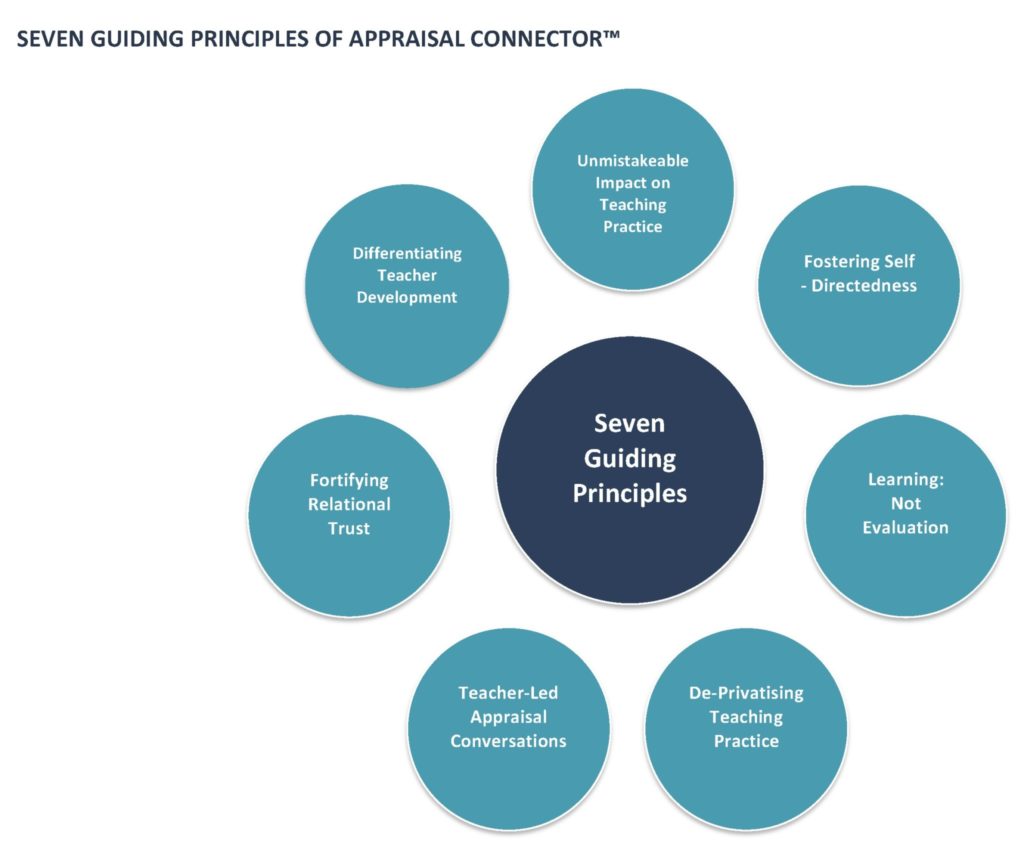Using InterLEAD Connector™ as a circuit breaker – guiding principles
“As you accelerate change you’ll need
many people driving change.”
John Kotter
Rather than relying on leaders modelling open and honest conversations to shift organisational culture, teachers using the InterLEAD Connector™ are positioned to also confidently lead their own open and honest conversations without fear and anxiety around their teaching practice. InterLEAD Connector™ is a smart system expediting the development of a psychologically safe culture because teachers are required to develop new practices and ways of talking, not just leaders. And the system removes many of the traditional obstacles and barriers, which have prevented teachers from doing so in the past.
InterLEAD Connector™ is an on-line self-review tool designed to simplify the potentially messy process of teacher self-appraisal. It requires teachers to do the vast majority of the cognitive and intellectual work around critically evaluating their teaching practice because research shows it must be the learner who does these things, not someone else. It’s the same for the students we teach.
Rather than being onerous, feedback from teachers and leaders using InterLEAD Connector™ consistently tell us moving to a high trust system, one honouring them as professionals whilst also providing them with a learning edge, has been one of the most rewarding and exciting experiences in their teaching careers. It complements teachers’ inquiry, action based research and improvement initiatives. Based on seven guiding principles the InterLEAD Connector™ supports teachers as adult learners and because it supports teachers to change behaviours it doubles as a culture development tool. It provides leaders a pathway to expedite the development of their school as an authentic Professional Learning Community underpinned by high levels of psychological safety.
Fostering Self-Directedness: At a time when we are asking students to be self–directed learners who monitor their progress, reflect, set challenging goals, identify when they have been successful and to establish next steps, InterLEAD Connector™ support teachers to do the same around their teaching practice. To strengthen teachers’ ability to learn how to learn, InterLEAD Connector™ provides teachers with multiple platforms to become highly effective at self-assessment and self-review.
Learning; Not Evaluation: Traditional appraisal systems are based on negative expectations. Reframing appraisal as a positive experience – one in which the teacher owns and controls – is respectful and professional. Providing opportunities for each teacher to identify previously hidden developmental pathways is empowering and fun. The experience is perceived as learning orientated, not a test.
De-Privatising Teaching Practice: Making it easy for teachers to talk openly and honestly about their strengths and developmental areas requires a psychologically safe organisational culture. Working differently through InterLEAD Connector™ – in ways removing the fear of judgement – allows teachers without fear to open their doors to colleagues.
Teacher-Led Appraisal Conversations (open to Learning): Incorporating research on what constitutes effective teaching practice, teachers using the InterLEAD Connector™ are able to formatively assess their practice and set goals in the right areas. Using the templates built in to the system, teachers are able to more easily synthesise and critically evaluate their teaching practice and in particular, the extent to which they are or are not impacting on student outcomes. Doing this in an on-going way empowers teachers to take ownership of any appraisal conversation because they are the ones undertaking the cognitive and intellectual work. Whilst traditional appraisal conversations have often been feared by teachers, teachers using the InterLEAD Connector™ look forward to them because they have self-directed their learning throughout the year.
Fortifying Relational Trust: With teachers self-directing their learning with insight, using research on what makes highly effective teaching practice, and being provided opportunities to self-review in ways honouring them as professionals, defensiveness is replaced by openness. Thinking together in conversations transforms relationships. Conversations morph from discussion to generative dialogue.
Differentiating Teacher Development: Reframing from evaluation to learning, teachers are more readily able to identify their next steps with accuracy and perception. Making it possible for teachers to explore areas of their teaching practice within their own zones of proximal development allows teachers to set challenging personalised goals. As we ask our students to be more responsible for this evolving independence teachers are able to apply the concept to themselves.
Unmistakeable Impact on Teaching Practice: Providing 40 research backed high impact development pathways and 120 potential goals/inquiries, teachers are able to confidently synthesise areas requiring attention and those areas they may need to focus on to maintain levels of mastery. Supporting teachers to perform outstandingly well in the right areas as opposed to the wrong areas allows teachers to work smarter, not harder.






 Find us on Facebook
Find us on Facebook